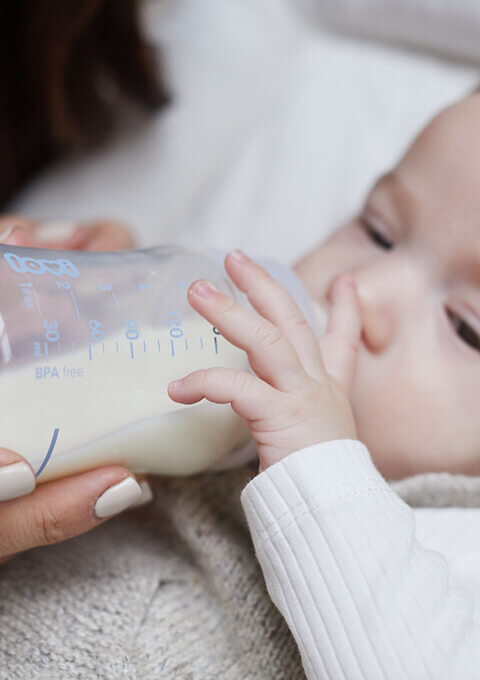Are you having trouble with your baby fussing during bottle feeding? Read on to find out why and how to solve the problem.
Expert consultant: Danuta Chrzanowska - Liszewska, MD, paediatric specialist and neonatologist
#Feeding problems
#Why does my baby squirm while bottle feeding
#How to bottle feed properly
#How to calm a baby
Breastfeeding is the best way to feed newborns, and the World Health Organization recommends exclusive breastfeeding for the first 6 months of life. However, sometimes mothers need to feed their babies differently, and in these cases, a bottle and carefully chosen baby formula can be helpful. But giving a bottle is not always easy. Sometimes babies squirm and refuse the bottle. This can be distressing and overwhelming for the mother.
There are several possible causes for this fussiness. However, it's important to remember that modern baby formula provides babies with enough nutrients they need to grow and develop.
If your baby is fussing during bottle feeding, you may need to try changing the feeding position, the type of baby milk, the teat, or the bottle.
There are a few reasons why babies might squirm while bottle feeding. One of them could be the bottle itself.
When choosing a bottle, make sure to consider its features and choose one that meets your and your baby's needs. Plastic bottles are lighter, but glass bottles are more eco-friendly and easier to clean. Consider the shape of the bottle and whether it will be easy for your to hold. Choose the right size, too. A larger bottle will last longer, but it will also be heavier. Also, check if the bottle is BPA-free.
Next, consider the teat. It should be the right size and have the correct flow speed. If the teat is incorrect, your baby may have difficulties and express frustration by fussing. If your baby is fussy during feedings, it could be a sign that the milk is flowing too fast or too slow.
In addition, choose a teat that helps to develop the mouth muscles needed for proper coordination of sucking, swallowing, and breathing. The best teats are made of safe silicone. If you are combining breastfeeding with bottle feeding, make sure the teat is not disrupting your baby's sucking reflex. Also, consider whether the teat has a vent valve, as this can help to reduce the risk of colic.
The wrong type of baby milk can have a negative impact on your baby, and your baby may not always accept the formula of the first choice. Consult with a paediatrician to determine the best formula for your child.
A fussy baby during feeding is a common sign of stomach problems. If your baby strains and spits up during feedings, talk to a paediatrician. The cause may be reflux.
If you want to be a proficient bottle feeder, having good bottle equipment is not enough. You also need to learn how to bottle feed properly.
Bottle-feeding position
Comfort is crucial for both you and your baby. The proper feeding position will help you relax. If your baby is fussy, try placing them in the same position you would use for breastfeeding. This can help them calm down.
Pick the right time for feeding
When you feed your baby is just as important as how you do it. A hungry, full, or tired baby can become upset quickly. Stick to a feeding schedule, but remember that a newborn should be fed on demand. While it's important to control the schedule, don't force your baby to finish the bottle if they are clearly refusing it. They may not be hungry or the break between feedings may have been too short.
Right milk temperature
Before giving your baby a bottle, check the temperature of the milk. Too cold or too warm milk can cause crying.
If you know how to bottle feed your newborn and they are still whining, consider other potential causes of their dissatisfaction, such as:
wet diaper,
strong or bright light,
an irritating tag on their clothing, or
excess noise.
If you are unable to calm your baby and you are feeling frustrated, try taking a deep breath and calming yourself first. Your baby can sense your emotions and will not calm down if you are stressed. Take a break from feeding and try hugging and rocking your baby.
If nothing seems to help and your baby continues to squirm while bottle feeding, make an appointment with the paediatrician. They will be able to advise you on how to calm your baby and may need to examine the baby to determine the cause of the fussiness. They may suggest trying a different formula or prescribe medication to help your baby absorb the milk.
During bottle feeding it is extremely important to ensure baby's health and safety, by preventing choking or possible problems with his tummy.
"May he grow healthily", this is parent's greatest wish from the moment of baby's birth. Ensuring the baby eats and gains weight correctly is a challenge taken by mothers, and a very difficult and stressful problem when it ...
You dreamed about breastfeeding. It has not worked. You are very upset, struggling with negative emotions, asking questions that hurt even more. You are worrying that bottle-feeding will not provide your baby with everything ...
